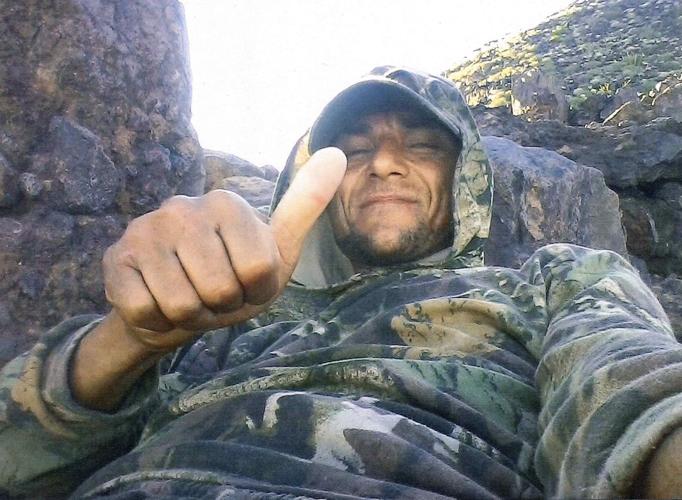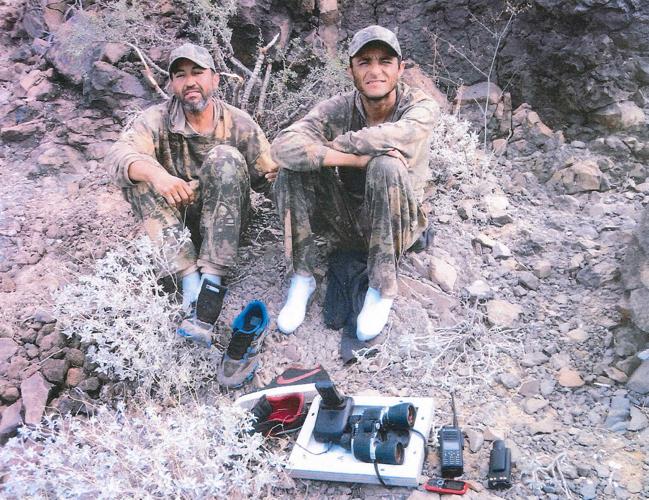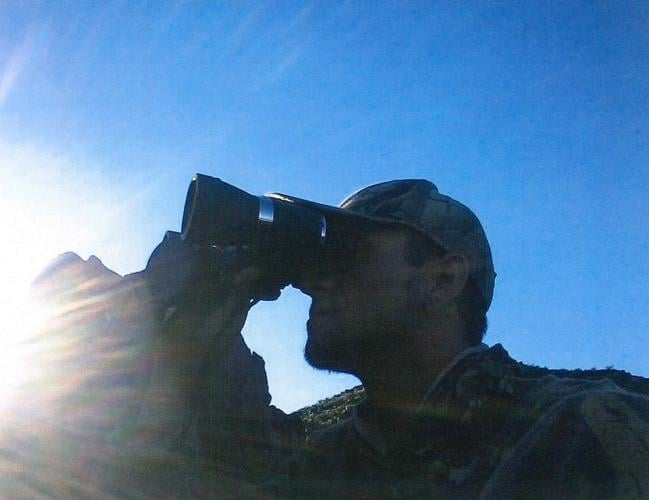For drug scouts stationed in Southern УлшжжБВЅтs mountains, the marijuana loads they help guide in the valleys below will now come back to haunt them as federal prosecutors use a new tactic to seek longer prison sentences.
Border Patrol agents are tracking the number and size of marijuana seizures in the line of sight т or тview shedт т of scouts while they are camped on mountainsides for weeks at a time, U.S. District Court records show. Those seizures are then cited by federal prosecutors when they ask judges to lengthen prison sentences for the lookouts.
The U.S. Attorneyтs Office has wrestled for at least four years with how to prosecute drug scouts, who often are arrested without marijuana, in Southern УлшжжБВЅ. During that time, typical charges for scouts changed from illegally crossing the border to conspiring to smuggle marijuana. Typical plea offers for scouts with no criminal history grew from six months to 13 months.
People are also reading…
Given that scouts are accused of conspiring to smuggle large amounts of marijuana they donтt possess when theyтre arrested, prosecutors often allow suspected scouts to plead guilty to conspiring to smuggle one backpack-load of marijuana, or about 40 pounds.
When agents report large seizures in the scoutтs view shed, the plea offer is upped to two backpack-loads or more, which can mean longer prison sentences, prosecutors wrote in sentencing memorandums.
The Star searched online court records since the start of 2015 and found nine scout prosecutions in the last year, including six since October, where prosecutors cited large marijuana seizures by Border Patrol agents and used those seizures to request longer sentences.
тThe reason pleas are climbing is weтre realizing and being able to prove how important these people are,т federal prosecutor Adam Rossi told Judge James A. Soto at a Feb. 7 sentencing hearing in U.S. District Court in УлшжжБВЅ.
тWe have a better understanding and actual marijuana to show how important scouts are to these organizations,т Rossi told the judge. тWithout them, the billions of dollars that are made by the cartels would not be possible.т
Rossi said agents seized 2,400 pounds of marijuana in the line of sight of Arturo Tellez-Berrelleza, 32, while he was working as a scout from a hideout in mountains on the Tohono Oтodham Reservation.
Rather than a typical 13-month plea offer, Rossi asked Soto to sentence Tellez to 37 months in prison. Soto handed down a 21-month sentence, citing Tellezтs need to support three children, his lack of education, the fact that it was his third season as a scout and a previous marijuana backpacking conviction in Pinal County.
The accusation against Tellez was not tethered to a specific amount of marijuana. As a result, he went from being arrested without any marijuana to pleading guilty to helping smuggle 400 pounds of marijuana. Rossi then connected Tellez to 2,400 pounds that was seized in his line of sight.
The U.S. Attorneyтs Office declined to comment. The Border Patrolтs УлшжжБВЅ Sector referred questions to the U.S. Attorneyтs Office.
Scout prosecutions in Southern УлшжжБВЅ gained steam after the November 2014 arrest of a scout in mountains near Ajo led to a March 2015 conviction on a drug-smuggling conspiracy charge.
The scout did not possess any marijuana, but he had been arrested before with scout gear.
His conviction was upheld by the 9th U.S. Circuit Court of Appeals in January 2017. The appeals court upheld the conviction in another scout case from Southern УлшжжБВЅ in September.
A review of more than 100 scout prosecutions and testimony from a Border Patrol agent shed light on how scouts operate and the years-long тprogression,т as Rossi called it, of increasingly targeting them.
When Border Patrol agents approached a group of marijuana backpackers near Why in December 2015, the smugglers тappeared to react to their presence before they should have been able to hear or see the agentsт and escaped, an agent wrote in a criminal complaint.
The agents suspected a scout had alerted the smugglers and set up surveillance. They saw Jose Martinez-Mata, a 32-year-old Mexican citizen, carrying a solar panel and a backpack up a mountainside.
The agents followed Martinez and arrested him.
They seized the solar panel, an encrypted two-way radio, a radio charger, a cellphone and 25 pounds of marijuana. He was sentenced to 13 months in prison in June 2016.
In September 2016, agents found military-style rifles when they arrested Jose Guzman-Perez, 27, and Lorenzo Infante-Ortiz, 20, at a scout site in the Roskruge Mountains northwest of Three Points. The two men said the rifles were needed to protect against rip-off crews.
During the arrest, Guzman fought with an agent. They fell off a cliff, which caused the agentтs shoulder to dislocate, a Homeland Security Investigations agent wrote in a criminal complaint.
Guzman was sentenced to 97 months in prison in October. Infante, who did not fight with an agent, was sentenced to 36 months.
Scouts serve as тair traffic controllersт
The role of a scout is to act as an тair traffic controllerт for groups of marijuana backpackers in the desert west of УлшжжБВЅ, Border Patrol Agent Carlos Rochin testified at a February 2016 hearing in federal court in УлшжжБВЅ.
As backpacker groups make their way across the valley below, the scout watches for law enforcement officers and makes sure the groups are staggered enough to not draw attention, according to a 32-page transcript of Rochinтs testimony.
Scouts тhold the groups until a couple of them have gone through and then keep the flow regulated,т Rochin said.
Some backpackers are professional smugglers, while a тgood portionт are migrants who cannot afford to pay the smugglerтs fee to cross the border and agree to haul marijuana instead, Rochin said.
Another way to avoid the smuggling fee is for migrants to agree to work as тgophersт for scouts, Rochin said. They bring food and water up to the scouts and тbabysitт marijuana loads while backpackers rest.
In the Ajo area, the scouting hierarchy includes head scouts who make sure other scouts are alert, as well as apprentice scouts, gophers, and people hired to bring supplies to the scouting site, Rochin said.
All of them have been prosecuted in recent years as authorities ramp up their efforts to thwart scouts, court records show.
Border Patrol agents arrested the suspected head of a scout network northeast of Lukeville, Jose Angel Felix Ramirez, 28, aka тCinco,т according to a criminal complaint filed in December by a Homeland Security Investigations agent.
In February 2017, agents arrested 11 people suspected of buying groceries, batteries, radios and other items in Phoenix and dropping them off in trash bags by the side of the road near scouting sites on the Tohono Oтodham Reservation.
A March 2017 case showed various types of scouts arrested all at once.
Panfilo Frias Bernal, a 35-year-old Mexican citizen, told agents he hurt his foot while hauling food for marijuana backpackers.
He waited for a few days on a ridge until another group came by and told him to head to the nearby mountainside. There, a scout offered him a job as a helper.
One of the men on the mountain was a scout for the тCusaт drug-trafficking organization, while two other men at the site worked for the тMemoт organization, according to a complaint.
Josue Ledgard Ruelas, a 26-year-old Mexican citizen, also was at the scout site. He told agents he agreed to haul marijuana to cover his smuggling fee to Phoenix. He crossed the border 12 days before, but he hurt his legs. A man told him to work as a scout helper, which he had done for three days while he healed.
Agents also arrested Gabino Rubio Von, a 41-year-old Mexican citizen, at the scout site.
Defense lawyer Ramiro Flores wrote in a Jan. 9 sentencing memorandum that Rubio agreed to scout to cover his smugglerтs fee and make an undetermined amount of money.
When agents asked him about his profession, Rubio reportedly said тwhat you got me doing today.т
Contact reporter Curt Prendergast at 573-4224 or cprendergast@tucson.com or on Twitter @CurtУлшжжБВЅStar





















